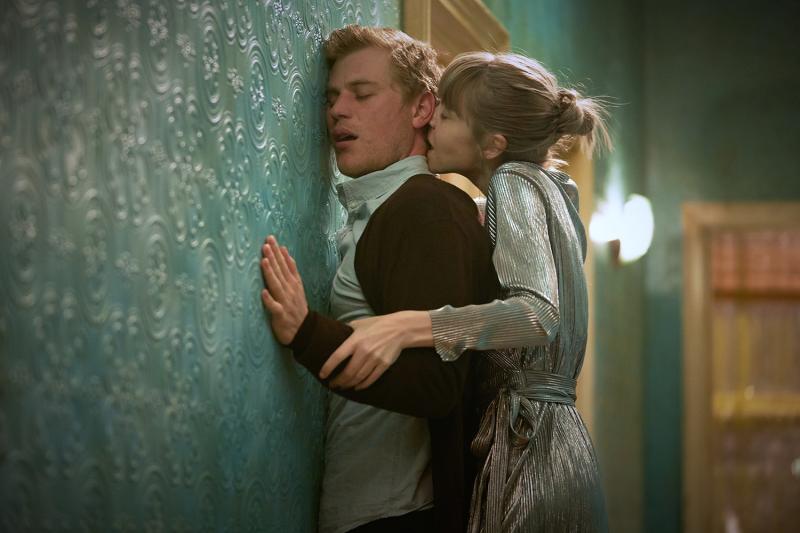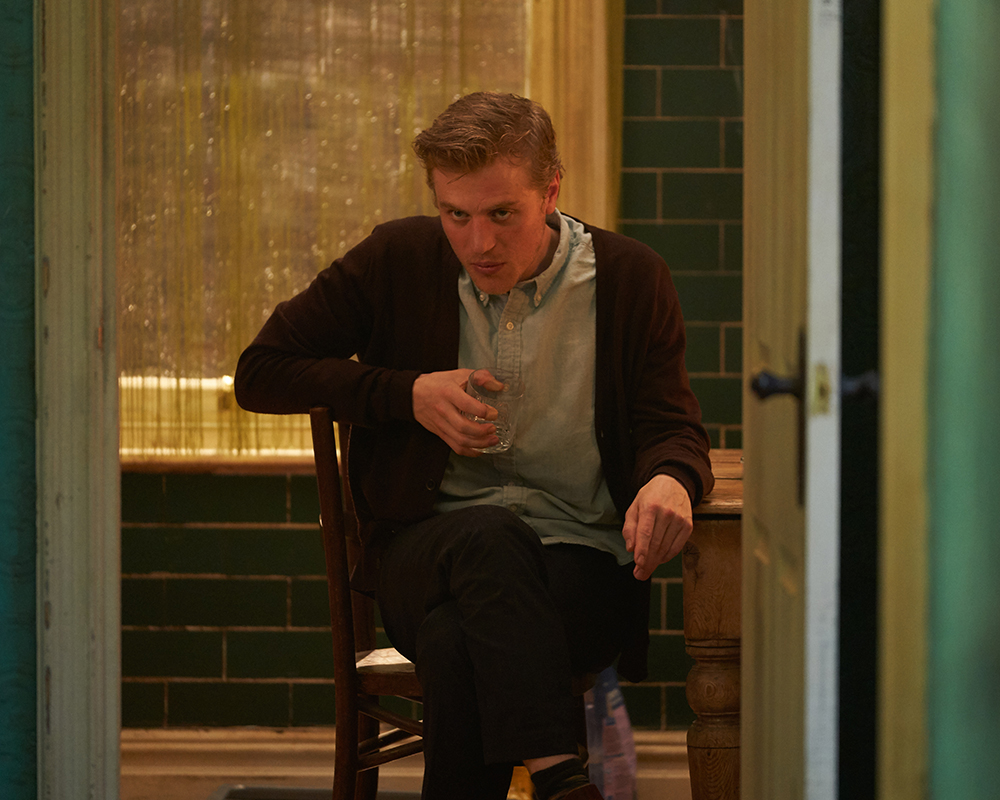Cordelia review – Antonia Campbell-Hughes and Johnny Flynn star in an off-kilter tale of trauma | reviews, news & interviews
Cordelia review – Antonia Campbell-Hughes and Johnny Flynn star in an off-kilter tale of trauma
Cordelia review – Antonia Campbell-Hughes and Johnny Flynn star in an off-kilter tale of trauma
Psychological drama about a traumatised woman and her weird neighbourhood

There's something deeply uncanny about Adrian Shergold's Cordelia. When the film's poster was released on social media, many mistook it for a kinky period drama with the power dynamics reversed. It definitely isn't a costume drama, but there's some kink.
Cordelia is a strange psychological chamber piece that's reminiscent of Adrian Lyne's masterful, and genuinely terrifying Jacob's Ladder, with elements of Roman Polanski's Repulsion. At the heart of the tale is Cordelia (Antonia Campbell-Hughes, who wrote the screenplay with Shergold), a fractured soul that following a traumatic event on the underground is struggling to keep a grip on reality.
She lives with her sister, Caroline (also played by Campbell-Hughes), the more vibrant of the two. When she leaves for a weekend away with her boyfriend (Joel Fry), Cordelia is left alone with only her thoughts for company and the rat-and-mouse-obsessed Mr Moses (Michael Gambon in a fleeting performance) who lives opposite her. Then by chance, she bumps into her cello-playing upstairs neighbour, Frank (Johnny Flynn), who buys her a cup of coffee - but, all is not well with this new-found friend.  The London that the film is set in is very recognisable, taking place in and around Bloomsbury and Soho. The glass-bricked gloam of Cordelia's basemen flat, previously occupied by her late father, feels off-kilter, in part thanks to Tony Slater Ling’s excellent camera work. It's a claustrophobic place, echoing the tube trauma from Cordelia's past. It feels more like a mindscape than a lived-in flat, and maybe it is. There's a nightmarish quality to the world. Fantasy and dreams slip deliriously back and forth, where it's impossible to tell what's real and what Cordelia is imagining. In one scene, Cordelia travels to her family home to bury a beloved pet. It's an unusual gesture, especially as she's carrying it on the train in a plastic bag - whether it has actually happened, it's impossible to tell.
The London that the film is set in is very recognisable, taking place in and around Bloomsbury and Soho. The glass-bricked gloam of Cordelia's basemen flat, previously occupied by her late father, feels off-kilter, in part thanks to Tony Slater Ling’s excellent camera work. It's a claustrophobic place, echoing the tube trauma from Cordelia's past. It feels more like a mindscape than a lived-in flat, and maybe it is. There's a nightmarish quality to the world. Fantasy and dreams slip deliriously back and forth, where it's impossible to tell what's real and what Cordelia is imagining. In one scene, Cordelia travels to her family home to bury a beloved pet. It's an unusual gesture, especially as she's carrying it on the train in a plastic bag - whether it has actually happened, it's impossible to tell.
Campbell-Hughes and Flynn have excellent on-screen chemistry. Flynn has an accent that makes you think of a young Phil Davis, but there's real menace there. Cordelia, on the other hand, is a product of trauma, where her fractured psyche switches between fight or flight at will, and her fight-response comes with a sharp bite.
As the film wears on, it's not just Cordelia that unravels. The narrative loses focus, and the joy of the cat-and-mouse dynamic of the first half of the film loses its edge. The result is frustrating, especially when the pacing slips. Still, there’s something to this strange, unnerving drama that sticks with you, even haunts you.
rating
Share this article
The future of Arts Journalism
You can stop theartsdesk.com closing!
We urgently need financing to survive. Our fundraising drive has thus far raised £49,000 but we need to reach £100,000 or we will be forced to close. Please contribute here: https://gofund.me/c3f6033d
And if you can forward this information to anyone who might assist, we’d be grateful.

Subscribe to theartsdesk.com
Thank you for continuing to read our work on theartsdesk.com. For unlimited access to every article in its entirety, including our archive of more than 15,000 pieces, we're asking for £5 per month or £40 per year. We feel it's a very good deal, and hope you do too.
To take a subscription now simply click here.
And if you're looking for that extra gift for a friend or family member, why not treat them to a theartsdesk.com gift subscription?
more Film
 Little Trouble Girls review - masterful debut breathes new life into a girl's sexual awakening
Urska Dukic's study of a confused Catholic teenager is exquisitely realised
Little Trouble Girls review - masterful debut breathes new life into a girl's sexual awakening
Urska Dukic's study of a confused Catholic teenager is exquisitely realised
 Young Mothers review - the Dardennes explore teenage motherhood in compelling drama
Life after birth: five young mothers in Liège struggle to provide for their babies
Young Mothers review - the Dardennes explore teenage motherhood in compelling drama
Life after birth: five young mothers in Liège struggle to provide for their babies
 Blu-ray: Finis Terrae
Bleak but compelling semi-documentary, filmed on location in Brittany
Blu-ray: Finis Terrae
Bleak but compelling semi-documentary, filmed on location in Brittany
 Oslo Stories Trilogy: Sex review - sexual identity slips, hurts and heals
A quietly visionary series concludes with two chimney sweeps' awkward sexual liberation
Oslo Stories Trilogy: Sex review - sexual identity slips, hurts and heals
A quietly visionary series concludes with two chimney sweeps' awkward sexual liberation
 Sorry, Baby review - the healing power of friendship in the aftermath of sexual assault
Eva Victor writes, directs and stars in their endearing debut feature
Sorry, Baby review - the healing power of friendship in the aftermath of sexual assault
Eva Victor writes, directs and stars in their endearing debut feature
 Blu-ray: Who Wants to Kill Jessie?
Fast-paced and visually inventive Czech comedy
Blu-ray: Who Wants to Kill Jessie?
Fast-paced and visually inventive Czech comedy
 Oslo Stories Trilogy: Love review - freed love
Gay cruising offers straight female lessons in a heady ode to urban connection
Oslo Stories Trilogy: Love review - freed love
Gay cruising offers straight female lessons in a heady ode to urban connection
 Beating Hearts review - kiss kiss, slam slam
Romance and clobberings in a so-so French melodrama
Beating Hearts review - kiss kiss, slam slam
Romance and clobberings in a so-so French melodrama
 Materialists review - a misfiring romcom or an undercooked satire?
Writer-director Celine Song's latest can't decide what kind of film it is
Materialists review - a misfiring romcom or an undercooked satire?
Writer-director Celine Song's latest can't decide what kind of film it is
 theartsdesk Q&A: actor Leonie Benesch on playing an overburdened nurse in the Swiss drama 'Late Shift'
The Guildhall-trained German star talks about the enormous pressures placed on nurses and her admiration for British films and TV
theartsdesk Q&A: actor Leonie Benesch on playing an overburdened nurse in the Swiss drama 'Late Shift'
The Guildhall-trained German star talks about the enormous pressures placed on nurses and her admiration for British films and TV
 Freakier Friday review - body-swapping gone ballistic
Lindsay Lohan and Jamie Lee Curtis's comedy sequel jumbles up more than their daughter-mother duo
Freakier Friday review - body-swapping gone ballistic
Lindsay Lohan and Jamie Lee Curtis's comedy sequel jumbles up more than their daughter-mother duo

Add comment